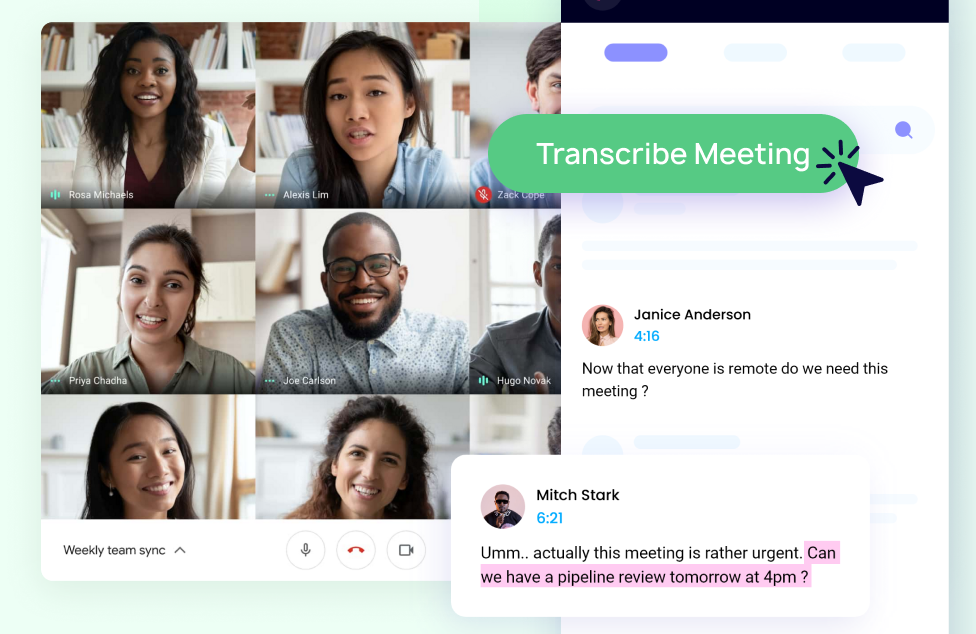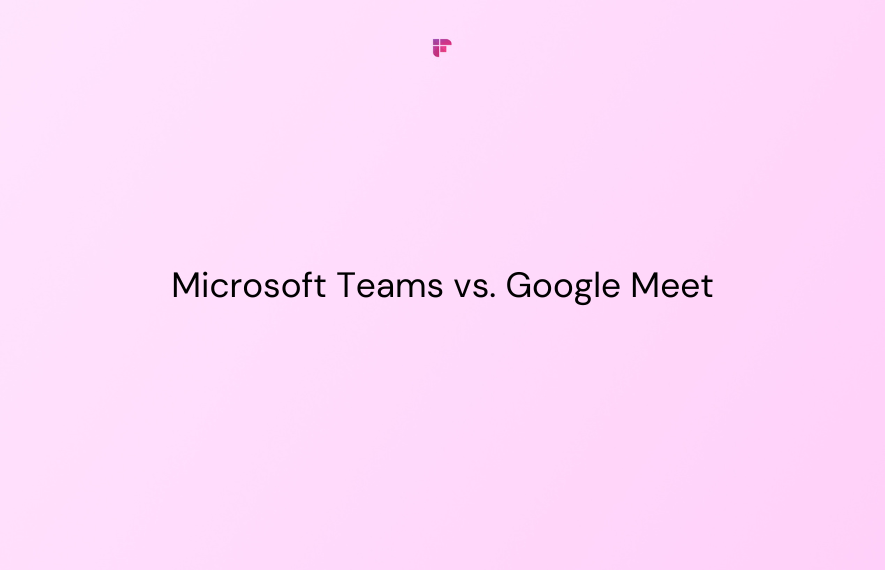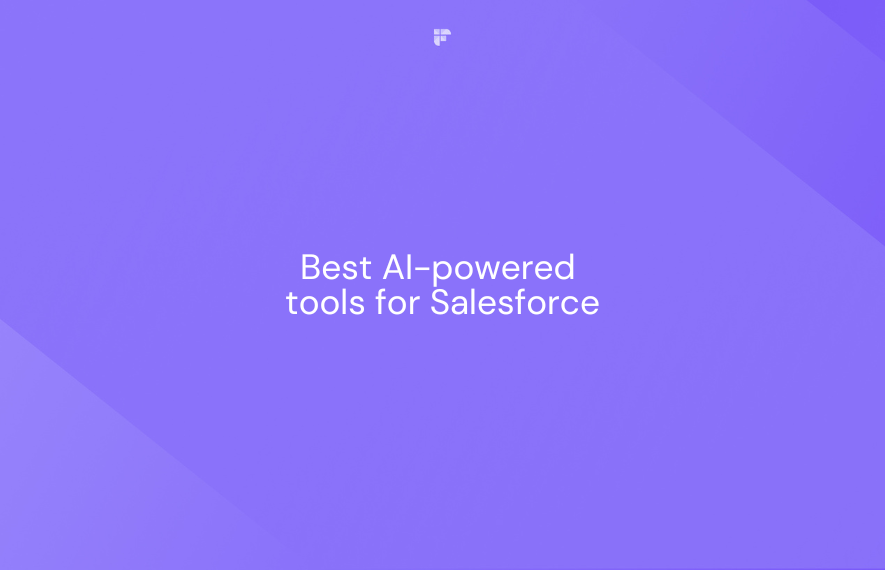Transcription software is on the rise—thanks to improved accuracy, cost-effectiveness, and smart collaboration features.
Be it sales, marketing, human resources, legal, or education, a transcription software is now a necessary tool in all of these domains and more.
But with so many transcription tools and services available, it’s difficult to choose one.
This comprehensive guide will give you the necessary information about transcription software—what it is, how it works, and how to choose the best transcription software.
What is Transcription Software?
Transcription software is an application that converts human speech (recorded or live) into a rich text transcript.
Some of the best transcription software can transcribe audio files, video files, and live sessions. A transcription software generates transcripts much faster than manual transcription, too. Think minutes, not hours.
These types of software uses speech recognition technology built on machine learning algorithms to learn and improve over time. However, the accuracy of transcription software depends on different factors like background noises, speakers' distance to the microphone, the type of microphone, and accents.
Transcription software is prominently used in different types of segments—from individuals to large corporations. The primary benefit of a transcript over audio and video recordings is that you’ll have a more comprehensible documentation of what happened during a call.
In Fireflies' case, the system automatically surfaces critical insights from every meeting that it was invited into. Those insights will coach you to have better interactions with your team and help you make strategic decisions.
The usage of meeting transcription software over manual transcription services has increased thanks to SaaS & cloud computing. It's now possible for every person or business to have automated transcripts.
The process is faster, secure, more efficient, and time-saving. And because of all these reasons, the transcription market is expected to rise to a valuation of US$1.68 Bn in 2021.
How Does Automatic Transcription Software Work?

A transcription software uses speech-to-text technology and works on artificial intelligence and natural language processing (NLP).
It replaces the need for tedious tasks such as manual note-taking. It also helps every meeting attendee to actively listen and fully engage in the conversation.
AI transcription software uses Automatic-Speech-Recognition (ASR) to listen, record the sound, and convert it into text.
AI transcription software in a nutshell:
- When an audio file is uploaded to a transcription software, NLP algorithms identify and process each speech sound;
- The next step is matching the sounds to words in the extensive dictionary included in the software;
- Finally, the sounds are translated into meaningful texts.
It’s interesting to note that AI transcription software has an ever-growing dictionary—expanding as new words, accents, and data are fed into the system over time. The accuracy also increases as the machine adapts to new data.
This is possible because of deep learning. Think of it as a structured way in which computers learn and adapt to new data. It enables them to think and act with less human intervention; deep learning is training machines to think using structures.
AI is the fuel for transcription software. The best transcription software will deploy AI to transcribe your video meetings in real-time. Consider Fireflies.ai—one of the best automatic transcription software—as an example.
Whenever Fireflies joins your calls, the system records them and generates an accurate transcript in minutes. This is helpful for businesses when it comes to boosting collaboration because of the ease of information sharing.
AI transcription is helpful for live and recorded sessions. From classroom lectures to interviews to town hall speeches to legal depositions, the use cases are endless.
Further, there are some areas where providing a live transcript is critical & necessary. For instance, a student needing hearing aids can participate equally with peers when a live AI-powered transcription is available.
This student will be able to read the professor’s lecture as well as the classroom dialogue and therefore has an equal opportunity to learn, collaborate, and succeed.
How voice-enabled technology uses Deep Learning to train STT Algorithms
An automatic transcription software is a perfect example of voice-enabled technology that relies on deep learning to train Speech-to-Text (STT). STT is a voice processing unit that takes audio user input (speech) and transcribes the sounds into text.
Majority of companies that train STT models implement manual transcription of all training sounds. The downside of this is the cost of data annotation used in this technique. It tends to be very high, and this affects the cost of high-quality, automated transcription.
Manual efforts are also needed in Natural Language Understanding (NLU)—a component takes text transcription of user input and extracts structured data (item, action requests, and entities) to understand human language.
In fact, some NLU tasks (e.g., Named Entity Recognition) require every word in the speech (live or recorded) to be labeled for the purpose of recognizing what that word indicates within the user input.
This is a repetitive process for hundreds of thousands of sentences. Transcribing and labeling is a tedious process. This is also why the best transcription software can be quite costly than others.
What to look for in Transcription Software?

- Accuracy: The best transcription software has a 90% accuracy rate. That said, accuracy also depends on the machine learning models a software uses and on the quality of the recording. Background noises, the quality of the microphone used, and the way the person speaks are some of the factors that affect accuracy.
- Optimization: And since AI trains on the output dataset, you can help make it more accurate by adding words or phrases that you often use. For instance, Fireflies’ Custom Vocabulary feature makes this possible. The system will train on those words to give you a more accurate output.
- Processing Time: The turnaround time varies per transcription software. It depends on the length of recording. On average, it usually takes about half an hour to transcribe an hour-long uploaded audio file or a live meeting. Fireflies.ai usually takes 15-20 minutes to record & transcribe a meeting. Note that if a service claims a 24-hour turnaround, it’s likely a human transcription service.
- Integrations: Modern AI transcription software runs on SaaS models. This enables them to integrate and connect with other apps to streamline workflow. It will also save you time by eliminating manual tasks such as automatically logging calls to your CRM. The major advantage is that integrations increase software functionality and save time switching between different tools. Before choosing a transcription software, check if it integrates with the app and web services that you often use as this will be cost-efficient in the long run.
- Usability: The ease of use is also something you need to consider. For the best experience, opt for transcription software that will give you a smooth user experience. It should have an easy-to-navigate user interface (UI) along with its powerful features. It should be easy enough that a how-to-use guide will become optional.
- Security: Data privacy & security is crucial in any software solution. Respect for the user should not only be dictated by regulations; it should be embedded at the very core of a software company because it's the right thing to do. Do take some time to review the security parameters a software company follows. Data privacy & security isn’t something you can trade-off. At Fireflies, we ensure that system security and customer privacy are prioritized at every step of the engineering process. Fireflies.ai is safe because it encrypts your data at rest, calendar events, emails, and other personally identifiable metadata.
To understand how secure Fireflies is, have a look at our Fireflies security practices.
- Pricing: Voice recognition is an intensive process and consumes a lot of server resources to work. Thus, you'll find that the best transcription software is mostly online and can't be downloaded. AI transcription technology requires expensive server resources to operate. That's why transcription software usually either charge by the hour or have an upper limit on the number of hours you can transcribe. Give it a test run. See if matches or even exceeds your expectations.
- Customer Service: Is the company fully committed in providing you a great post-purchase experience? The answer to this should be a resounding yes. There is a huge difference between saying that you're "customer-centric" and actually being one.
Industries That Uses Transcription Software
The use of transcription software spans across multiple industries. The industries where it is often used are the following:
- Sales: Using AI transcription software in sales helps save time, make the sales process efficient, and increases the closing rate. You can transcribe sales calls for training and feedback purposes. You can use it to onboard and coach new sales reps for better interactions, too.
- Legal: Record of a conversation between two or more parties is important in legal proceedings. Transcription provides tangible proof of what happened with great clarity.
- Education: Using AI transcription software will help you focus on the lecture instead of manually jotting down notes. Another upside is that you’ll be able to review all your class notes in a much more organized and easy way.
- Human Resources: AI transcription helps you log calls, notes, transcripts, and meeting recordings into your ATS system. Transcribing interviews is also beneficial in training new HR specialists. They can easily read and listen to previous interviews to see what works and what doesn't. You can also send these transcripts to senior hiring managers to give them a comprehensive overview of the candidate. It eliminates unnecessary reptitions.
- Consultancy: A transcription software is especially helpful for consultants when it comes to documenting their clients’ needs, decisions, and commitments.
- Podcasts: Upload a podcast audio file or directly record the podcast from your browser to get an accurate text version. You can then add the podcast transcripts on your website or podcast platforms for better discoverability and SEO.
Final Thoughts
Maximising the insights gained from calls can be blocked by biases inherent to manual transcription as well as note-taking. Aside from that, the amount of time saved and the boost in efficiency is what makes a lof of businesses rely on it.
The future of AI automated transcription software will only keep getting better.
For now, it's important to look for a transcription software that matches your needs. It could be the features, usability, pricing, or customer support. And if you need more information, request for a demo.
Best of luck to you!
Image illustration by Storyset







